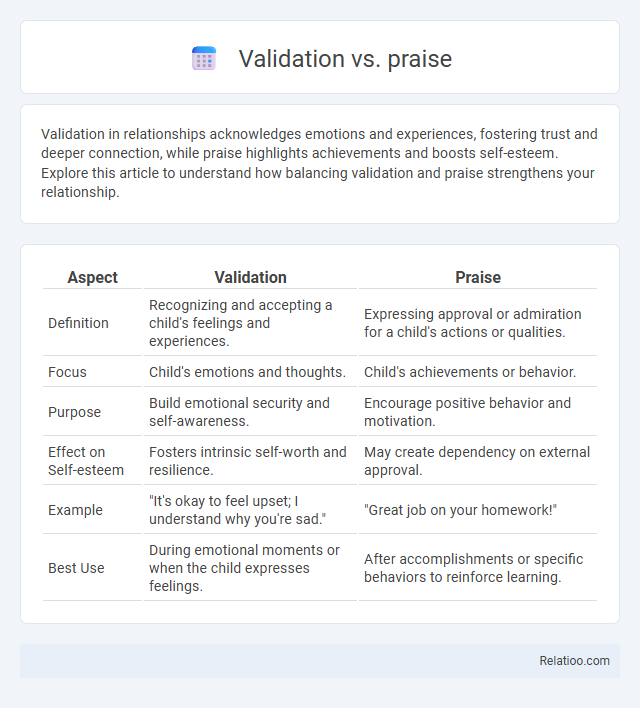Validation in relationships acknowledges emotions and experiences, fostering trust and deeper connection, while praise highlights achievements and boosts self-esteem. Explore this article to understand how balancing validation and praise strengthens your relationship.
Table of Comparison
| Aspect | Validation | Praise |
|---|---|---|
| Definition | Recognizing and accepting a child's feelings and experiences. | Expressing approval or admiration for a child's actions or qualities. |
| Focus | Child's emotions and thoughts. | Child's achievements or behavior. |
| Purpose | Build emotional security and self-awareness. | Encourage positive behavior and motivation. |
| Effect on Self-esteem | Fosters intrinsic self-worth and resilience. | May create dependency on external approval. |
| Example | "It's okay to feel upset; I understand why you're sad." | "Great job on your homework!" |
| Best Use | During emotional moments or when the child expresses feelings. | After accomplishments or specific behaviors to reinforce learning. |
Understanding Validation and Praise
Validation involves recognizing and affirming Your feelings or experiences, creating a foundation for emotional security and self-awareness. Praise typically highlights achievements or behaviors, boosting motivation but sometimes leading to external dependency if overused. Understanding the difference helps You foster intrinsic confidence without relying solely on validation seeking.
Key Differences Between Validation and Praise
Validation affirms your feelings and experiences as genuine and important, fostering self-awareness and emotional growth, while praise focuses on recognizing achievements or behaviors, often encouraging specific actions or performance. Validation addresses internal states and emotions, affirming worth regardless of outcomes, whereas praise is outcome-driven and may hinge on external success or approval. Seeking validation involves relying on others to confirm your value or feelings, which can lead to dependency, whereas praise and validation ideally support autonomy and internal confidence.
Psychological Impact of Validation
Validation provides genuine recognition of your feelings and experiences, fostering self-esteem and emotional well-being. Praise often highlights achievements but may not address your inner emotional state, sometimes leading to conditional self-worth. Validation seeking, when excessive, can result in dependency on external approval, undermining authentic self-confidence and psychological resilience.
Psychological Effects of Praise
Praise serves as positive reinforcement that boosts self-esteem and motivation by acknowledging specific behaviors, while validation confirms an individual's feelings and experiences, fostering emotional security. Excessive praise can lead to over-reliance on external approval, diminishing intrinsic motivation and promoting validation seeking, where individuals base self-worth on others' opinions. Psychological research highlights that balanced validation encourages internal confidence, whereas relentless pursuit of praise may increase anxiety and reduce resilience.
When to Use Validation
Validation supports emotional well-being by acknowledging Your feelings and experiences, fostering self-awareness and confidence. Praise highlights achievements or behaviors, encouraging motivation and reinforcing positive actions. Use validation when someone expresses emotions or vulnerabilities, creating a safe space for authentic connection rather than offering praise, which is better suited for celebrating accomplishments.
When Praise Is Most Effective
Praise is most effective when it is specific, sincere, and focused on effort rather than innate ability, fostering intrinsic motivation and resilience. Validation supports emotional well-being by acknowledging feelings and experiences, but excessive validation seeking can undermine self-esteem and create dependency on external approval. Balancing praise with authentic validation encourages healthy self-confidence and promotes independent self-worth.
Validation vs. Praise in Parenting
Validation in parenting involves acknowledging and accepting your child's feelings and experiences, fostering emotional security and self-awareness, while praise often emphasizes achievements or behaviors, potentially leading to external motivation. Validation helps children develop intrinsic self-worth by affirming their inner experiences, whereas excessive praise might cause dependence on external approval and validation seeking. Understanding the difference empowers you to support your child's emotional growth without encouraging validation seeking.
Validation vs. Praise in the Workplace
Validation in the workplace involves recognizing and affirming an employee's feelings and efforts, fostering a sense of belonging and motivation, whereas praise focuses primarily on acknowledging specific achievements or behaviors. You benefit most when validation addresses your intrinsic value and contributions, leading to increased engagement and job satisfaction beyond the temporary boost praise provides. Understanding the distinction helps managers create a supportive environment that encourages authentic feedback rather than mere approval seeking.
Building Self-Esteem: Validation or Praise?
Building self-esteem through validation involves recognizing and affirming your intrinsic feelings and experiences, which fosters genuine self-worth. Praise often centers on external achievements or behaviors, which can create dependency on approval rather than internal confidence. You benefit more by seeking validation that supports self-acceptance instead of relying heavily on praise or validation seeking, which may undermine long-term self-esteem.
Choosing the Right Approach for Positive Growth
Validation strengthens self-worth by recognizing genuine achievements, while praise often highlights specific behaviors or outcomes to encourage motivation. Relying on validation seeking can undermine confidence, leading to dependence on external approval rather than internal growth. Choosing the right approach involves fostering intrinsic validation through self-awareness and targeted praise that supports authentic development for sustained positive growth.

Infographic: validation vs praise
 relatioo.com
relatioo.com